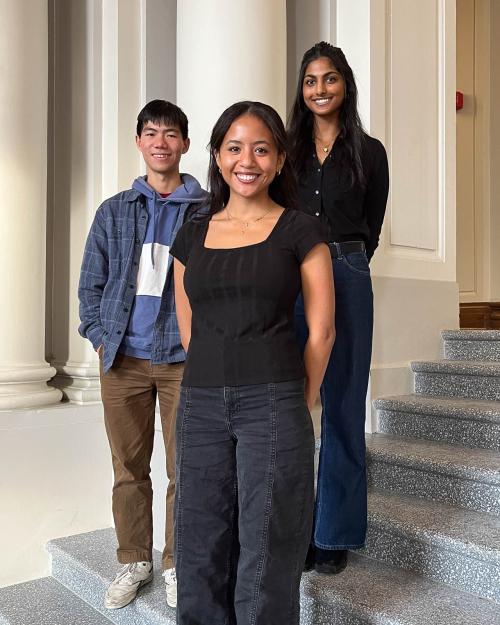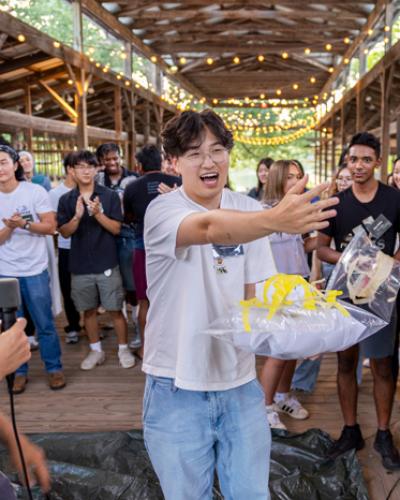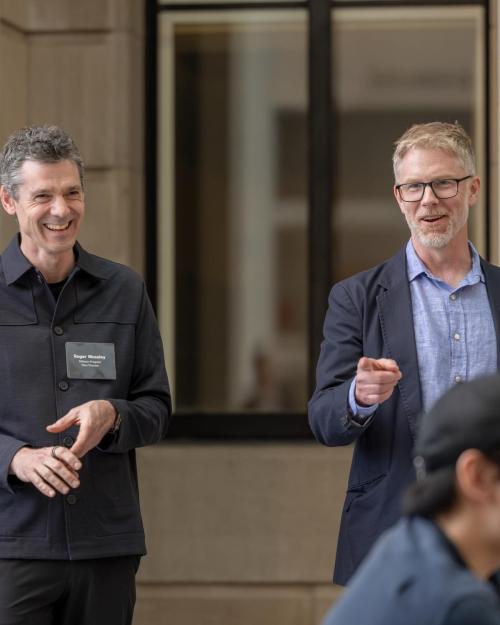When I first read about the Milstein program, I thought someone was playing a practical joke on me. I wanted to study both computer science and its ethical implications on our lives, and suddenly here was this program, seemingly tailored to my exact interests. When I got in, once I stopped screaming and jumping around enough to catch my breath, my thoughts went to the thirteen members of my cohort. I knew the program’s success would depend on whether we could bond as a group. I tried to imagine what they would be like, and to be honest, I felt a little intimidated. I didn’t know what to expect, but I remember imagining a group of full stack web developers in turtlenecks quoting random lines from Hamlet and talking about the nonprofits they had started in 7th grade.
Thankfully, my fellow cohort members turned out to be far more approachable than that. After a few icebreakers and a trip to the low ropes course, it became clear that we were going to get along great, and the twenty-five new members that joined this year are fitting in seamlessly. What’s especially amazing about the program is that, although we’re all fascinated by the intersection between technology and the humanities, that intersection is broad enough that everyone has their own unique interests that the rest of us can learn from.
To give you an idea of our different interests, five cohort members, old and new, told me about their summers and gave me permission to share them here. Hopefully you will get a picture of the people who make up this diverse program, at least a better one than I first imagined.
 Rayna Klugherz is a member of the incoming freshman cohort and a prospective art history student. Through Milstein she hopes to learn not only about how technology can be used to study art history, but about graphic design and how the field has evolved over the past few decades. This summer, she spent a week touring eleven museums all over Massachusetts to learn more about different art movements before beginning her studies here at Cornell. And to think some people complain about summer reading.
Rayna Klugherz is a member of the incoming freshman cohort and a prospective art history student. Through Milstein she hopes to learn not only about how technology can be used to study art history, but about graphic design and how the field has evolved over the past few decades. This summer, she spent a week touring eleven museums all over Massachusetts to learn more about different art movements before beginning her studies here at Cornell. And to think some people complain about summer reading.
 Of all our summers, Geoff Brann's was likely the most transformational. He spent 3 months living in a rural homestay in Nepal. The most shocking part of his trip, he says, was that, despite living in a mud house with a single outlet, everyone in his host family had a smartphone. This opened Geoff’s eyes to the power and reach of big tech companies, and their potential to affect worldwide positive change. As an incoming freshman, he now wants to study ethics as well as computer science, making him a perfect fit for the program.
Of all our summers, Geoff Brann's was likely the most transformational. He spent 3 months living in a rural homestay in Nepal. The most shocking part of his trip, he says, was that, despite living in a mud house with a single outlet, everyone in his host family had a smartphone. This opened Geoff’s eyes to the power and reach of big tech companies, and their potential to affect worldwide positive change. As an incoming freshman, he now wants to study ethics as well as computer science, making him a perfect fit for the program.
 Peter Munn is one of the eleven sophomores who joined the program at the end of last year. He lived in a hostel in San Francisco this summer in the Tenderloin district where he did competitive market analysis for a software company. Here at Milstein, he’s shifting his focus to hardware. His project team is developing a hat for the visually impaired that will use audio signals to help communicate what is in front of the wearer. Truly a man of many talents.
Peter Munn is one of the eleven sophomores who joined the program at the end of last year. He lived in a hostel in San Francisco this summer in the Tenderloin district where he did competitive market analysis for a software company. Here at Milstein, he’s shifting his focus to hardware. His project team is developing a hat for the visually impaired that will use audio signals to help communicate what is in front of the wearer. Truly a man of many talents.
 The defining moment of Kira Segenchuk’s summer was her bike ride from Massachusetts, to Maine. A sophomore and avid cyclocross competitor, Kira rode over one hundred miles every day for three days straight, eventually arriving at her grandparent’s cabin. She thought about quitting on mile 113 of the first day (approximately 93 miles past where I would have quit) but pushed through. The last thirty or forty miles of the final day were a smooth, gradual uphill where she was cruising at 19mph, which she says is one of the most peaceful things she’s ever experienced.
The defining moment of Kira Segenchuk’s summer was her bike ride from Massachusetts, to Maine. A sophomore and avid cyclocross competitor, Kira rode over one hundred miles every day for three days straight, eventually arriving at her grandparent’s cabin. She thought about quitting on mile 113 of the first day (approximately 93 miles past where I would have quit) but pushed through. The last thirty or forty miles of the final day were a smooth, gradual uphill where she was cruising at 19mph, which she says is one of the most peaceful things she’s ever experienced.
 Chukwudumebi Obi is another new freshman. He decided that he wanted to gain a new skill before the summer was over, so he learned how to make music on FL Studio with synthesizers and samples. He also started learning Blender, a program for making animations and 3D models. He’s working for the Milstein Program this year, and hopes to use what he’s learned to make engaging multimedia.
Chukwudumebi Obi is another new freshman. He decided that he wanted to gain a new skill before the summer was over, so he learned how to make music on FL Studio with synthesizers and samples. He also started learning Blender, a program for making animations and 3D models. He’s working for the Milstein Program this year, and hopes to use what he’s learned to make engaging multimedia.
 Chloe Kanders, is a sophomore studying information science. She spent the summer working at a preschool. While she was there, she was interested in how early the kids picked up on society’s gender norms. When asked what they wanted to be when they grew up, nearly all the boys said fireman or policeman, while the girls said princess or mommy. She hopes to return next year after she gets back from the Cornell Tech campus on Roosevelt Island and be a role model so that some of the girls might say technologist instead of princess next time around.
Chloe Kanders, is a sophomore studying information science. She spent the summer working at a preschool. While she was there, she was interested in how early the kids picked up on society’s gender norms. When asked what they wanted to be when they grew up, nearly all the boys said fireman or policeman, while the girls said princess or mommy. She hopes to return next year after she gets back from the Cornell Tech campus on Roosevelt Island and be a role model so that some of the girls might say technologist instead of princess next time around.




